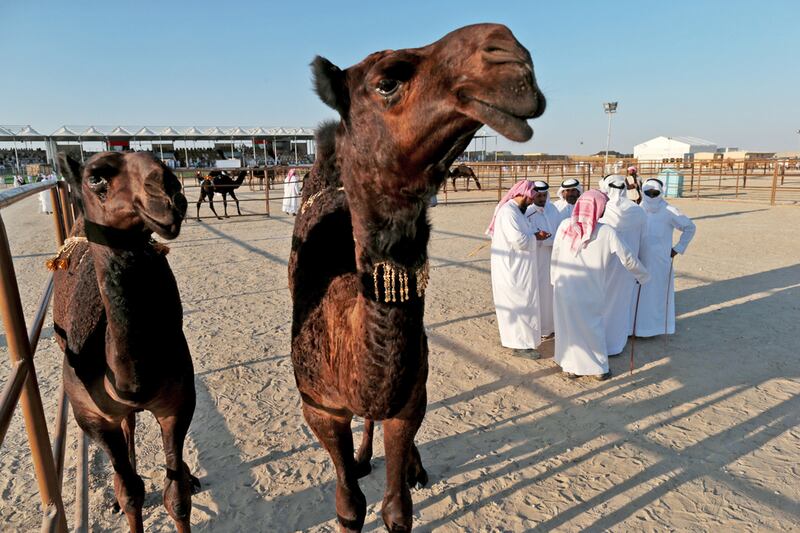ABU DHABI // History and heritage took centre stage as the seventh annual Al Dhafra Festival opened in the Western Region on Saturday.
As always, camels feature prominently, with an auction, race and mazayana (beauty) competition expected to pull in crowds over the event’s two-week run.
Visitors will also be able to enjoy an Arabian horse race, a classic car competition, a dates packaging competition, a saluki race, and a falcon hunting competition.
One of the highlights is the traditional market, which offers a window into the past by showcasing hand-made Emirati products.
The market’s 180 stalls are run by Emirati women selling crafts and home-made goods, perfumes and incense they have mixed and made themselves, and medicinal herbs and traditional tali embroidery.
With the support and encouragement of the President, Sheikh Khalifa, the festival is able to preserve and promote Emirati heritage and traditions, said Mohammed Khalaf Al Mazrouei, chairman of the organising committee.
“The preservation of heritage, one of the main pillars of our national identity and civil and human capital, represents a cornerstone of the policy that was established by the late Father Sheikh Zayed bin Sultan Al Nahyan, may God bless his soul,” he said.
“The festival has gained international renown for promoting the Bedouin culture and positioning Al Dhafra in the Western Region on the international map of tourism. A cornerstone in the heritage preservation strategy, the festival enjoys high-level care and interest.
“Al Dhafra embodies the ambition of our leadership to stimulate the economic movement and transform the Western Region into an international cultural and tourist destination.”
Khalid Rashid Al Darei drives from his home in Al Ain to the festival every year.
“I attend every year and try to go more than once,” he said. “This festival in particular brings all the tribes in the UAE as well as the Gulf with each other.
“What makes it better is the ceremonies that each tribe puts together if they win in one of the races or competitions, and everyone wants to win.”
Participation from GCC countries has increased since last year, said Mr Al Darei, who believes their input creates an even better atmosphere.
“The interaction in the festival is the best, you do not feel like a stranger even though you are mixing with others from different tribes and countries,” he said.
“The joy and excitement in this particular festival is ever lasting to the last day, and one joy becomes joys when we are celebrating with our brothers and sisters.”
Another reason for Al Dhafra festival’s success is the organisers’ ability to pull in crowds by providing an “exceptional experience”, said Mr Al Darei.
“There are many activities, including camels, salukis, horses and dates, so they please everyone,” he said.
Sheikhs are always the first to attend the ceremonies, which makes the participants even happier, Mr Al Darei said.
Attending the festival’s opening ceremony was Sheikh Hamdan bin Zayed, the Ruler’s Representative in the Western Region.
“The joy of our leaders and their celebrations with us show their interest in making their people happy,” he said. “That in itself is an honour to us.”
Mr Al Darei, whose hobby is photography, usually takes his camera to the festival.
“I come up with a schedule and mainly focus on the happiness I see on the visitors’ faces,” he said. “Today I didn’t take any shots as I left early, but I will of course be back.”
The first Al Dhafra Festival was held in April 2008, and the event has grown to become one of the Western Region’s main attractions.
A saluki race and falcon hunting competition were added in 2011, which helped to attract visitors from Arab countries including Yemen and Jordan.
An increase in the number of participants and visitors also means an increase in prize money, with Dh50 million being handed out this year.
The festival will close on December 28.
aalkhoori@thenational.ae






